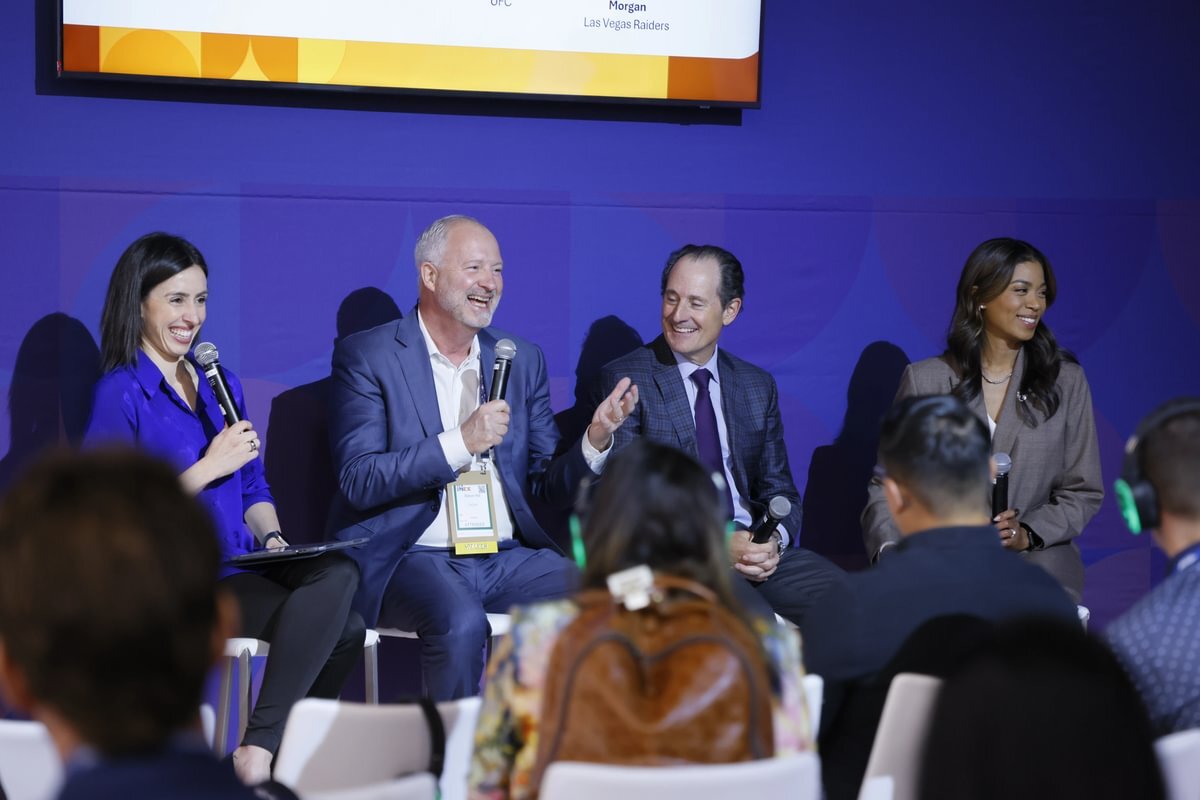In the boardroom and beyond, one question often rings louder than ever:
What makes a company truly thrive?
For many CEOs, the answer is elusive. It’s not just product innovation, customer satisfaction, or even financial metrics. It’s culture. Culture, the unseen yet potent force shaping every interaction, decision, and outcome. It can either be the wind at your back or the storm in your face.
At IMEX America this year, we introduced a new concept—Emergent Leadership Day—moderated by leadership expert, Holly Ransom. It was designed to unpick what makes a great leader and a great culture in business today, and why both are important to long-term commercial success, and even brand legacy.
After interviewing CEOs and senior leaders from Hilton, Access DMC (a company that has three CEOs, not one!), IMEX Group, the UFC, Las Vegas Convention and Visitors Authority (LVCVA) and the Las Vegas Raiders, Holly found that several behaviors repeatedly came up in those personal and revealing conversations.

What is culture, really?
Culture isn’t free snacks, casual Fridays, or a ping-pong table in the office. These are perks, not principles.
Culture is the collective mindset and behaviors that guide how a team works, communicates, and aligns with the company mission. It’s the invisible thread that connects company values to outcomes.
And, as these leaders made very clear, if you want to raise the bar and build a strong culture, it takes consistent, intentional work. This is the act of nurturing, protecting and caring…about your people.
Unsurprisingly, winning ‘the game of company culture’ is all about action, not about talk.
Insight one: Culture doesn’t happen by chance—it’s designed, modeled, and reinforced every day.
And where does that modeling start? It starts with the CEO.
Practice. Practice. Practice… Did we mention practice?
The theme of applied knowledge also ran strongly throughout the day. It turns out great leaders not only make time for learning, but they also treat newly learned information with respect, asking themselves ‘how does this apply to my team?’, ‘does this apply to our customers’ experience of our brand?’ and ‘is this something we can experiment with in our business?’
Whether you’re a leader or not, in a world dominated by new information at every blink of the eye, the difference lies not just in consuming knowledge but questioning and applying it. For those whose leadership skills are a cut above, the learning never stops. They just keep growing, upwards.
Be it a podcast, a book, a research paper or a news article, great leaders make time to absorb and then purposefully digest what they’ve learned. How? They schedule the time.

Insight two: Don’t just consume information, consider it.
And now we come to a real biggie! Intellectual humility.
There is no learning without failing, making mistakes, taking a wrong turn or getting lost in a bad decision but then having the confidence and courage to reframe a sunk cost as a well-timed lesson.
As Holly heard throughout the day, great leaders don’t always get it right, and they know it. In fact, great leaders understand, mostly from their lived experience, that company success depends on them modeling what it looks and feels like when they get it wrong.
Above all, they’re humble. It turns out the ability to say ‘we made a mistake and we’ve learned from it. Now, let’s move on…’ is a CEO’s superpower.
Insight three: Humility is a defence against arrogance, pride and stubbornness but, more than that, it clears the path to an even stronger culture and a more profitable future.
Why culture is non-negotiable
Culture isn’t just a feel-good concept; it’s a competitive advantage—or disadvantage. A thriving culture attracts top talent, builds customer loyalty, and ensures resilience in tough times.
On the flip side, a neglected culture leads to turnover, inefficiency, and reputational damage. Yes, even with a toxic culture a company can achieve skyrocketing revenues for a while, but a short-term financial boost can mask long-term erosion in morale, collaboration, and trust. Corrosion then becomes a matter of time.
The journey to building a great culture isn’t linear, but with intention, humility, and consistency, leaders can shape an environment where people and performance soar.
So, CEOs and senior leaders, the question is no longer whether culture matters—it’s what kind of culture you’re building today. Are you raising the bar?
Join the IMEX community to stay up to date with the global business events industry.
- > Sign up





